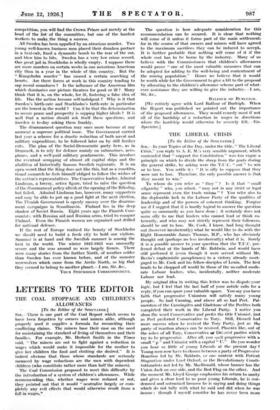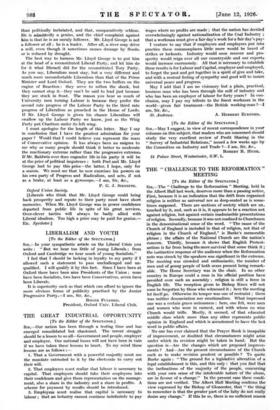THE LIBERAL CRISIS -
• [To the Editor of the SPECTATOR.] Sin,—In your Topics of the Day, under the title, " The Liberal Crisis," you reply to A. E. M.'s very sensible argument, which contended that "support the Constitution" was too vague a principle on which to divide the sheep from the goats during the general strike, by asking were the T.U.C. " out " to win or to lose. You settle it : " It is silly to suppose that they were out to lose. Therefore, the only possible answer is that they meant to win."
To whom do you refer as " they " ? Is it that "small oligarchy" who, you admit, "may not in any strict or legal sense represent even the trade unions " ? You refer also to the deplorable lack in the Labour Party of the qualities of leadership and of the powers of coherent thinking. Forgive me if I suggest that it is hardly logical to answer the question quite so summarily as you have done : it certainly does not seem silly to me that leaders who cannot lead or think co- herently, and who may not strictly represent their followers, should be out to lose. Mr. Cook, I know, had long thought out (however incoherently) what he would like to do with the Right Honourable James Thomas, M.P., who has obviously thought out (perhaps no less incoherently) what it is. Surely it is a possible answer to your question that the T.U.C, pre- ferred defeat at the hands of Mr. Baldwin, and would have still preferred it (even though it were served without Mr. Bevin's euphemistic paraphrases) to a victory already- mort- gaged to Mr. Cook and his fellow-disciples of Lenin. The first heads to be chopped off would be those of the so-called mode- rate Labour leaders, who, incidentally, neither moderate Labour nor lead.
My original idea in writing this letter was to dispute your logic, but I feel that the last half of your article calls for a reply, if you can spare your valuable space. You say you have faith that progressive Unionism will satisfy many young people. So had Canning, and above all so had Peel. Pal- merston of the Canningites and Gladstone of the Peelites both completed their work in the Liberal Party. I notice you shun the word Conservative and prefer the title Unionist, just as Peel preferred • Conservative to Tory. Still, Disraeli had more success when he revived the Tory Party, just as the party of reaction always can be revived, Phoenix like, out of the ashes of all Tory, Conservative or Unionist parties which try to be progressive. After all, you spell progressive with a small "p "and Unionist with a capital " U." Do you wonder you hear so little of young Liberals at the pretient day ? Young men now have to choose between a party of Progressive Reaction led by Mr. Baldwin, or one content with Patient Stagnation under Lord Oxford, or the Revolutionary Consti- tutionalists not led by Mr. MacDonald, whose banner has the Union Jack on one side, and the Red Flag on the other. And the moment Mr. Lloyd George emphasizes his return to sanity and gives a clear lead to us poor young Liberals, he is con- demned and ostracized because he is saying and doing things which do not tally with what he said and did when he was insane ; though- I myself consider he has never been inoie
than politically inebriated, and that, comparatively seldom. He is admittedly a genius, and the chief complaint against him is that he is an unruly follower. Mr. Lloyd George is not a follower at all ; he is a leader. After all, a river may drive a mill, even though it sometimes causes damage by floods, or is reduced by drought. .
The best way to harness Mr. Lloyd George is to put him at the head of a reconstituted Liberal Party, and let him do for it what Disraeli did for the reconstituted Tory Party. As you say, Liberalism must stay, but a very different and much more uncomfortable Liberalism than that of the Prime Minister and Lord Oxford. They are the two buffers on the engine of Reaction : they serve to soften the shock, but they cannot stop it—they can't be said to lead just because they are stuck in front. The reason you hear so much of University men turning Labour is because they prefer the second rate progress of the Labour Party to the third rate progress of Liberalism as preached in the House of Lords. If Mr. Lloyd George is given his chance Liberalism will swallow up the Labour Party we know, just as the Whig Party put Chartism under its left wing.
I must apologise for the length of this letter. May I say in conclusion that I have the greatest admiration for your paper ? Would that I could believe you represent the mass of Conservative opinion. It has always been an enigma to me why so many people should think it better to moderate the reactionary extreme rather than the progressive extreme.
If Mr. Baldwin ever does engender life in his party it will be at the price of political impotence : both Peel and Mr. Lloyd George had to pay this price—the latter, I hope, only for a season. We must see that he now exercises his powers on his own party of Progress and Radicalism, and acts, if not as a brake, at least as a gyroscope.—! am, Sir, &c., P. G. J. Srxsmrisi.
Oxford Union Society.
[Liberals who think that Mr. Lloyd George could bring back prosperity and repute to their party must have short memories. When Mr. Lloyd George was in power confidence departed from public life in spite of his great services. Over-clever tactics will always be badly allied with Liberal idealism. Too high a price may be paid for genius.— En. Spectator.]























































 Previous page
Previous page